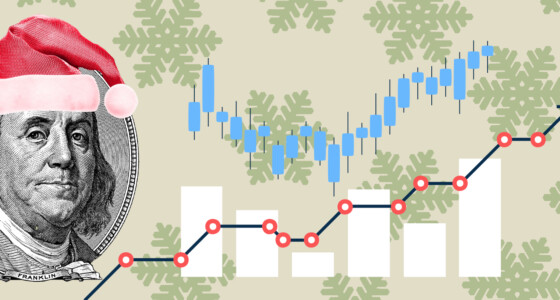

Regarding calculating trading turnover, two methods are commonly used: the Tradewise method and the Scripwise method. While the Tradewise method is considered the accurate approach, the Scripwise method is widely employed due to its simplicity in intraday trading turnover calculation.
Understanding that both methods yield the exact profit/loss figure is essential. However, the turnover calculation for intraday trading may differ significantly between the two. In this article, we’ll explain in-depth how to calculate turnover in intraday trading, as well as forex, futures and options trading.
We will also illustrate how both the Tradewise and Scripwise methods work using everyday examples from the trading world since it is important to learn how these methods function both in theory and action.
What Is Turnover For Intraday Trading?
Intraday trading involves buying and selling shares within a single trading day. The goal is to profit from short-term price movements rather than owning the shares. These profits are subject to taxation. The turnover for intraday trading is calculated by adding up the absolute amounts of profit/losses.
How To Calculate Turnover For Intraday Trading?
The turnover in the case of intraday trading can be calculated on Scripwise or Tradewise methods.
Scripwise Turnover
In the Scripwise method, we also consider the sum of positive and negative differences, but we calculate the absolute profit by summing the absolute values of profits and losses for each scrip during the financial year.
Example
- Trade 1:
Emil bought 500 units of XYZ Inc. at USD 50 on 10/03/2023.
Emil sold 500 units of XYZ Inc. at USD 60 on 11/03/2023.
- Trade 2:
Emil bought 300 units of Paytm at USD 30 on 20/04/2023.
Emil sold 300 units of Paytm at USD 25 on 25/04/2023.
- Profit:
Profit from 1st Trade = (60-50) * 500 = USD 5000
Loss from 2nd Trade = (25-30) * 300 = USD -1,500
Absolute Profit = 5000 + (-1,500) = USD 3,500
Tradewise Turnover
Absolute profit refers to the sum of positive and negative differences. Under the Tradewise method, we calculate the absolute profit by adding up the absolute values of profits and losses for each trade during the financial year.
Example
- Trade 1:
Ektha bought 100 units of ABC Inc. at USD 75 on 14/02/2023.
Ektha sold 100 units of ABC Inc. at USD 80 on 15/02/2023.
- Trade 2:
Ektha bought 200 units of ITC Inc. at USD 50 on 21/06/2023.
Ektha sold 200 units of ITC Inc. at USD 40 on 24/06/2023.
- Profit:
Profit from 1st Trade = (80-75) * 100 = USD 500
Profit from 2nd Trade = (40-50) * 200 = USD -2000
Total Absolute Profit = 500 + 2000 = USD 2500
How to Calculate Trading Turnover for Tax Audit Assessment?
To determine the applicability of Tax Audit, let’s focus on examples for calculating turnover in intraday trading. In this case, we’ll talk about some well-known stocks that every trader encounters one way or the other during their career.
Calculate Trading Turnover for Equity Intraday Trading
| Stock | Quantity | Buy Date | Buy Price | Sell Date | Sell Price | Profit/Loss |
| Apple Inc. | 50 | 05/03/2023 | $150 | 05/03/2023 | $155 | $250 |
| Microsoft Corp. | 30 | 12/04/2023 | $250 | 12/04/2023 | $240 | -$300 |
Trading Turnover for Equity Intraday Trading = Absolute Profit
Tradewise Turnover = $250 + $300 = $550
Scripwise Turnover = $250 + (-$300) = -$50
Calculate Trading Turnover for Equity Delivery Trading
| Stock | Quantity | Buy Date | Buy Price | Sell Date | Sell Price | Profit/Loss |
| Amazon.com Inc. | 20 | 08/05/2023 | $3,200 | 08/05/2023 | $3,180 | -$400 |
| Google (Alphabet Inc.) | 15 | 20/06/2023 | $2,500 | 20/06/2023 | $2,600 | $1,500 |
Trading Turnover for Equity Delivery Trading = Absolute Profit
Tradewise Turnover = $400 + $1,500 = $1,900
Scripwise Turnover = -$400 + $1,500 = $1,100
Calculate Trading Turnover for Equity / Currency / Commodity / Futures and Options Trading
| Stock | Quantity | Buy Date | Buy Price | Sell Date | Sell Price | Profit/Loss |
| Bank Nifty Futures | 75 | 18/02/2022 | $10,922 | 18/02/2022 | $10,893 | -$2,175 |
| Bank Nifty Futures | 40 | 20/08/2023 | $24,624 | 20/08/2023 | $24,851 | $9,080 |
Trading Turnover for Futures and Options Trading = Absolute Profit
Tradewise Turnover = $2,175 + $9,080 = $11,255
Scripwise Turnover = -$2,175 + $9,080 = $6,905
For Equity Intraday Trading, both the Tradewise and the Scripwise methods may yield different results, but they will not affect the profit/loss outcome. It’s crucial to understand these distinctions to determine the share or options trading turnover for tax audit correctly.

How To Calculate Turnover In Forex Trading?
The daily turnover of forex trading is determined by adding up all the trades conducted in a day. This includes trades between banks, trades between banks and clients, and trades between individual traders. The Bank for International Settlements (BIS) collects data from central banks and other financial institutions to calculate the daily turnover in the forex market.
So, according to the BIS, we’ll give the average daily turnover of forex trading per day. It is equal to $6.6 trillion. This makes it the largest financial market in the world.
How to Calculate Turnover for F&O Trading?
To calculate the turnover for a financial year, consider both favorable and unfavorable trades made in Futures and Options trading. For example, if you made the following trades in a year, they would be included in the turnover calculation:
| Name | Type of trade | Lot Size | Value of purchase | Sale Value | Profit/(Loss) | Turnover |
| Asian Paints | Future | 500 | 4,000 | 3,900 | (50,000) | 50,000 |
| HUL | Option | 600 | 4,500 | 3,700 | (800) | 4,500 |
| HDFC Bank | Future | 400 | 5,000 | 5,100 | 40,000 | 40,000 |
| ICICI Bank | Option | 600 | 6,000 | 6,500 | 500 | 7,000 |
| 19,500 | 19,200 | (10,300) | 1,01,500 |
Let’s look at the data from the table in more detail and find out how to calculate turnover in Future and Options trading:
- The turnover of all futures trades was calculated in absolute terms
To calculate the turnover of futures transactions, we use the purchase value multiplied by the lot size and the sales value multiplied by the lot size. The difference between these values gives us the profit or loss, which is considered the turnover.
For example, if 500 lots of Asian Paints were purchased at 4,000 and sold at 3,900, the profit/loss of 50,000 is considered the turnover.
Similarly, if 400 lots of HDFC Bank were purchased at 5,000 and sold at 5,100, the profit/loss of 40,000 is considered the turnover.
- The turnover of all options trades is not calculated in absolute terms
The turnover, in this case, was calculated using the following formula:
Sale Value + Absolute Profit/ (Loss)
For the purchase and sale of 600 lots of ICICI Bank, a profit of 500 was made because lots were purchased at 6,000 and sold at 6,500. The turnover is 7,000 when the sales value is added.
In the case of 600 lots of HUL, a loss of 800 was made from the purchase and sale. The turnover is 4500 if you add the sales value of 3,700.
The total turnover for all these trades has been calculated by adding up all the turnovers of all trades and will be equal to 1,01,500. To calculate the final turnover, you must consider the expenses and subtract them from the turnover. These expenses include electricity, broker commission, internet, etc.
Let’s say your total costs are 3,000. Therefore, the turnover is calculated as 1,01,500 – 3,000, which equals 98,500.
The Bottom Line
Calculating turnover in intraday trading is important because, depending on your country of residence, you might be required to specify it for a tax audit.
Understanding the best methods for calculating trading turnover and absolute profit is also essential. While the Tradewise method provides a precise calculation by considering profits and losses for each individual trade, the Scripwise method offers a simpler approach, summing up the absolute values of profits and losses for each scrip during the financial year.
Regardless of the chosen method, both yield the exact profit/loss figure, ensuring an accurate assessment of trading performance. However, it’s important to note that the turnover calculation may vary significantly between the two methods.
Whether you opt for Tradewise or Scripwise methods, having a clear understanding of these techniques will empower you to make informed decisions, ensuring compliance with tax regulations and enhancing your trading strategies. Always stay vigilant in managing your trades to assess your financial performance and optimize your investment endeavors accurately.










